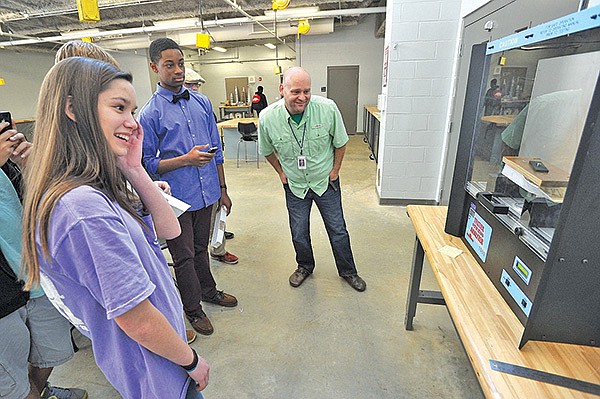Curriculum Promotes STEM Education In Northwest Arkansas Schools
STAFF PHOTO MICHAEL WOODS Morgan Branham, Chidubem Egbosimba, both Fayetteville High School students, and teacher Randal Dickinson watch Jan. 16 as they test the strength of a student’s bridge during class.
Monday, February 17, 2014
Vic Dreier might have had a different career if he had been able to take engineering courses in high school.
Dreier, a former Fayetteville teacher, works with schools and businesses in three states to promote engineering and biomedical education. His job as director of school engagement for Project Lead The Way is to help establish the program in elementary, middle and high schools.
Project Lead the Way is a nonprofit organization that developed an engineering curriculum offered in 13 Northwest Arkansas schools, including Springdale, Bentonville and Fayetteville.
Web Watch
Lead The Way
For more information on Project Lead the Way: https://www.pltw.or…; EAST: http://www.eastinit… and New Tech: http://www.newtechn…
Source: Staff Report
The U.S. Department of Commerce projects STEM jobs, those in science, technology, engineering and math, will grow 17 percent by 2018.
“There will an estimated 1.2 million unfilled STEM jobs by 2018,” said Jennifer Cahill, senior director of media and public relations for Project Lead the Way. “It is critical that we prepare today’s students for these careers.”
Critics of STEM education have called it unnecessary. Derek Lowe, a blogger, native Arkansan and graduate of Hendrix College, says driving people into science careers doesn’t necessarily produce good scientists and could create indifferent scientists.
Too many scientists will dilute the job market and drive down salaries, Lowe wrote in Corante, a blog on technology, science and business.
Project Lead the Way offers four packaged engineering curriculums for students at all grade levels and a high school program in biomedical science. A computer science program will launched in the coming months.
The courses have been developed to follow the Common Core standards.
About 600,000 students in 5,000 schools use the curriculum in the U.S. and England.
The cost of an elementary curriculum is about $10,000 to $14,000 for a school equipped with computer tablets, Drier said. The cost is determined by the level, the number of students and the technology at the school, he said.
BUILDING BRIDGES
Projects range from building a mechanical arm at Woodland Junior High School in Fayetteville to building bridges at Fayetteville High School.
Students then test the strength of the scale models they designed and built. Then they calculate the structural efficiency using weight, load and other factors.
Rick Nouketcheussi, 15 and in the 10th grade, built one of the strongest bridges.
“I love classes with math,” Nouketcheussi said. “I also like to design and build cool stuff.”
Other students said they too like the hands-on work.
“Math and science are enjoyable and I like building and how things work.” Morgan Branham, 15, said, “I may want to be an engineer.”
Ninth-graders in Kristian Cartwright’s class on engineering design at Woodland is actively designing puzzle cubes which will be started the second semester designing puzzle cubes that will be created on a 3-D printer. The students will also design the packaging and develop a sales plan.
Corwin Stites, 14, explained the cube has to have five interlocking parts and measure two-and-a-quarter inches.
AT A GLANCE
Local Schools
Northwest Arkansas schools that offer the curriculum are: Fulbright Middle School, Lincoln Junior High, Washington Junior High and Bentonville High School in Bentonville; Lakeside Junior High and Springdale High School in Springdale; Leverett Elementary, Ramay and Woodland junior highs and Fayetteville High School in Fayetteville; and Gravette, Siloam Springs and Prairie Grove high schools.
Source: Staff Report
Stites likes using the design software and techniques.
“I want to be an engineeer when I go to college,” Stites said. “I’ve definitely learned a lot here.”
The sequence of courses offered at the junior high level also includes introductory courses in engineering, energy and robotics for eighth-graders.
SPRINGDALE ACADEMY
Project Lead the Way is incorporated into the Engineering and Architecture Academy, one of four career academies, at Springdale High School. Teachers of core classes also teach some of the engineering courses, said Claire Small, lead technical teacher. It was launched about six years ago.
Students can spend three years in the academy where they are exposed to careers in science, technology, engineering and math.
“Kids don’t see themselves in some of these professional fields,” Dreier said.
“You are around people with the same interests,” said Madison Moore, an 18-year-old senior who plans to study biomedicine at the University of Arkansas. She has been part of the academy for four years.
Yasmin Chavez said she didn’t know anything about engineering until she went to a summer camp as a seventh-grader at the University of Arkansas. The 18-year-old will be heading to Massachusetts Institute of Technology. As a senior project, Chavez and Moore are developing a device to convert sign language into written words.
OTHER PROGRAMS
A longtime popular program, Environmental and Spatial Technology, develops problem solving skills through local community projects. Fayetteville and Springdale offer EAST and Project Lead the Way side by side.
Engineering students in Springdale often take an EAST course as one of their electives, Small said.
Both provide hands-on activities and promote career opportunities, Dreier said.
Students come out of these courses with life skills such as critical thinking, Dreier said.
“They can solve problems on their own and think on their feet,” Dreier said of those skills. “Sometimes students are not getting these skills.”
Project Lead the Way is a curriculum that fits into a school model, such as the New Tech Network, Dreier said.
Lance Arbuckle, director of New Technology High School in Rogers, said New Tech is based on instruction. Instruction is applied to all aspects of core course work, he said. For instance, he said, English is integrated with American history and the team teachers guide the students into a project based on what they are studying.
